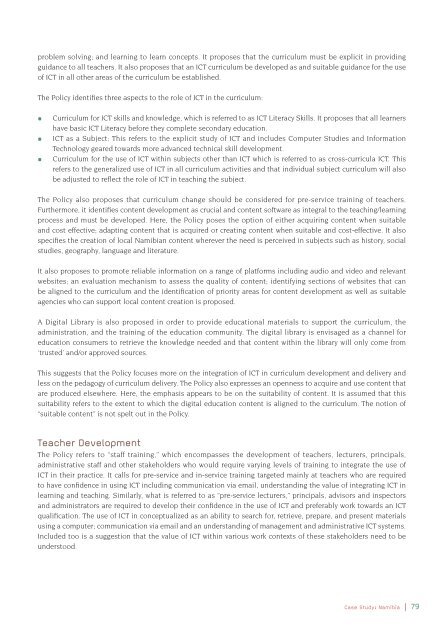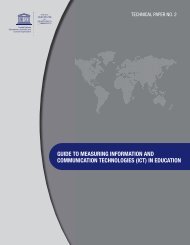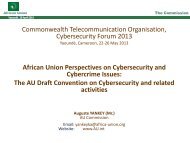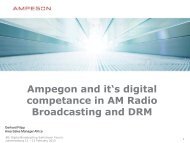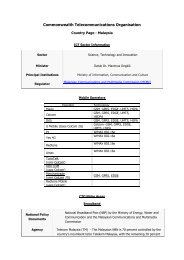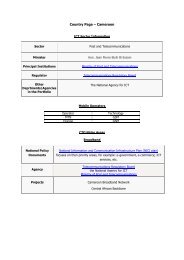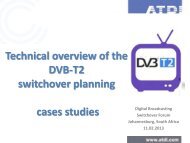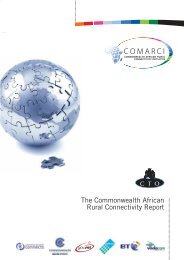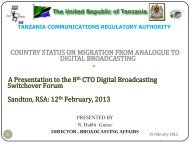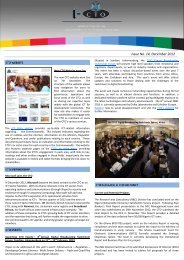Transforming education: the power of ICT policies - Commonwealth ...
Transforming education: the power of ICT policies - Commonwealth ...
Transforming education: the power of ICT policies - Commonwealth ...
Create successful ePaper yourself
Turn your PDF publications into a flip-book with our unique Google optimized e-Paper software.
problem solving; and learning to learn concepts. It proposes that <strong>the</strong> curriculum must be explicit in providing<br />
guidance to all teachers. It also proposes that an <strong>ICT</strong> curriculum be developed as and suitable guidance for <strong>the</strong> use<br />
<strong>of</strong> <strong>ICT</strong> in all o<strong>the</strong>r areas <strong>of</strong> <strong>the</strong> curriculum be established.<br />
The Policy identifi es three aspects to <strong>the</strong> role <strong>of</strong> <strong>ICT</strong> in <strong>the</strong> curriculum:<br />
apple Curriculum for <strong>ICT</strong> skills and knowledge, which is referred to as <strong>ICT</strong> Literacy Skills. It proposes that all learners<br />
have basic <strong>ICT</strong> Literacy before <strong>the</strong>y complete secondary <strong>education</strong>.<br />
apple <strong>ICT</strong> as a Subject: This refers to <strong>the</strong> explicit study <strong>of</strong> <strong>ICT</strong> and includes Computer Studies and Information<br />
Technology geared towards more advanced technical skill development.<br />
apple Curriculum for <strong>the</strong> use <strong>of</strong> <strong>ICT</strong> within subjects o<strong>the</strong>r than <strong>ICT</strong> which is referred to as cross-curricula <strong>ICT</strong>. This<br />
refers to <strong>the</strong> generalized use <strong>of</strong> <strong>ICT</strong> in all curriculum activities and that individual subject curriculum will also<br />
be adjusted to refl ect <strong>the</strong> role <strong>of</strong> <strong>ICT</strong> in teaching <strong>the</strong> subject.<br />
The Policy also proposes that curriculum change should be considered for pre-service training <strong>of</strong> teachers.<br />
Fur<strong>the</strong>rmore, it identifi es content development as crucial and content s<strong>of</strong>tware as integral to <strong>the</strong> teaching/learning<br />
process and must be developed. Here, <strong>the</strong> Policy poses <strong>the</strong> option <strong>of</strong> ei<strong>the</strong>r acquiring content when suitable<br />
and cost effective; adapting content that is acquired or creating content when suitable and cost-effective. It also<br />
specifi es <strong>the</strong> creation <strong>of</strong> local Namibian content wherever <strong>the</strong> need is perceived in subjects such as history, social<br />
studies, geography, language and literature.<br />
It also proposes to promote reliable information on a range <strong>of</strong> platforms including audio and video and relevant<br />
websites; an evaluation mechanism to assess <strong>the</strong> quality <strong>of</strong> content; identifying sections <strong>of</strong> websites that can<br />
be aligned to <strong>the</strong> curriculum and <strong>the</strong> identifi cation <strong>of</strong> priority areas for content development as well as suitable<br />
agencies who can support local content creation is proposed.<br />
A Digital Library is also proposed in order to provide <strong>education</strong>al materials to support <strong>the</strong> curriculum, <strong>the</strong><br />
administration, and <strong>the</strong> training <strong>of</strong> <strong>the</strong> <strong>education</strong> community. The digital library is envisaged as a channel for<br />
<strong>education</strong> consumers to retrieve <strong>the</strong> knowledge needed and that content within <strong>the</strong> library will only come from<br />
‘trusted’ and/or approved sources.<br />
This suggests that <strong>the</strong> Policy focuses more on <strong>the</strong> integration <strong>of</strong> <strong>ICT</strong> in curriculum development and delivery and<br />
less on <strong>the</strong> pedagogy <strong>of</strong> curriculum delivery. The Policy also expresses an openness to acquire and use content that<br />
are produced elsewhere. Here, <strong>the</strong> emphasis appears to be on <strong>the</strong> suitability <strong>of</strong> content. It is assumed that this<br />
suitability refers to <strong>the</strong> extent to which <strong>the</strong> digital <strong>education</strong> content is aligned to <strong>the</strong> curriculum. The notion <strong>of</strong><br />
“suitable content” is not spelt out in <strong>the</strong> Policy.<br />
Teacher Development<br />
The Policy refers to “staff training,” which encompasses <strong>the</strong> development <strong>of</strong> teachers, lecturers, principals,<br />
administrative staff and o<strong>the</strong>r stakeholders who would require varying levels <strong>of</strong> training to integrate <strong>the</strong> use <strong>of</strong><br />
<strong>ICT</strong> in <strong>the</strong>ir practice. It calls for pre-service and in-service training targeted mainly at teachers who are required<br />
to have confi dence in using <strong>ICT</strong> including communication via email, understanding <strong>the</strong> value <strong>of</strong> integrating <strong>ICT</strong> in<br />
learning and teaching. Similarly, what is referred to as “pre-service lecturers,” principals, advisors and inspectors<br />
and administrators are required to develop <strong>the</strong>ir confi dence in <strong>the</strong> use <strong>of</strong> <strong>ICT</strong> and preferably work towards an <strong>ICT</strong><br />
qualifi cation. The use <strong>of</strong> <strong>ICT</strong> in conceptualized as an ability to search for, retrieve, prepare, and present materials<br />
using a computer; communication via email and an understanding <strong>of</strong> management and administrative <strong>ICT</strong> systems.<br />
Included too is a suggestion that <strong>the</strong> value <strong>of</strong> <strong>ICT</strong> within various work contexts <strong>of</strong> <strong>the</strong>se stakeholders need to be<br />
understood.<br />
Case Study: Namibia | 79


